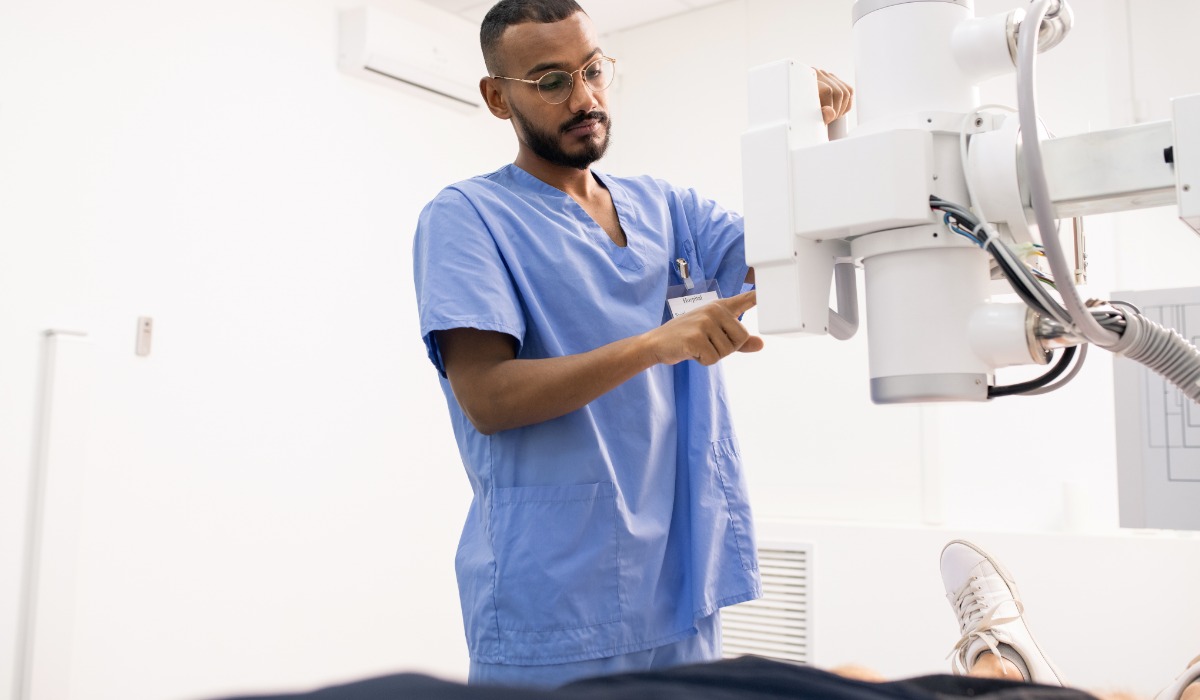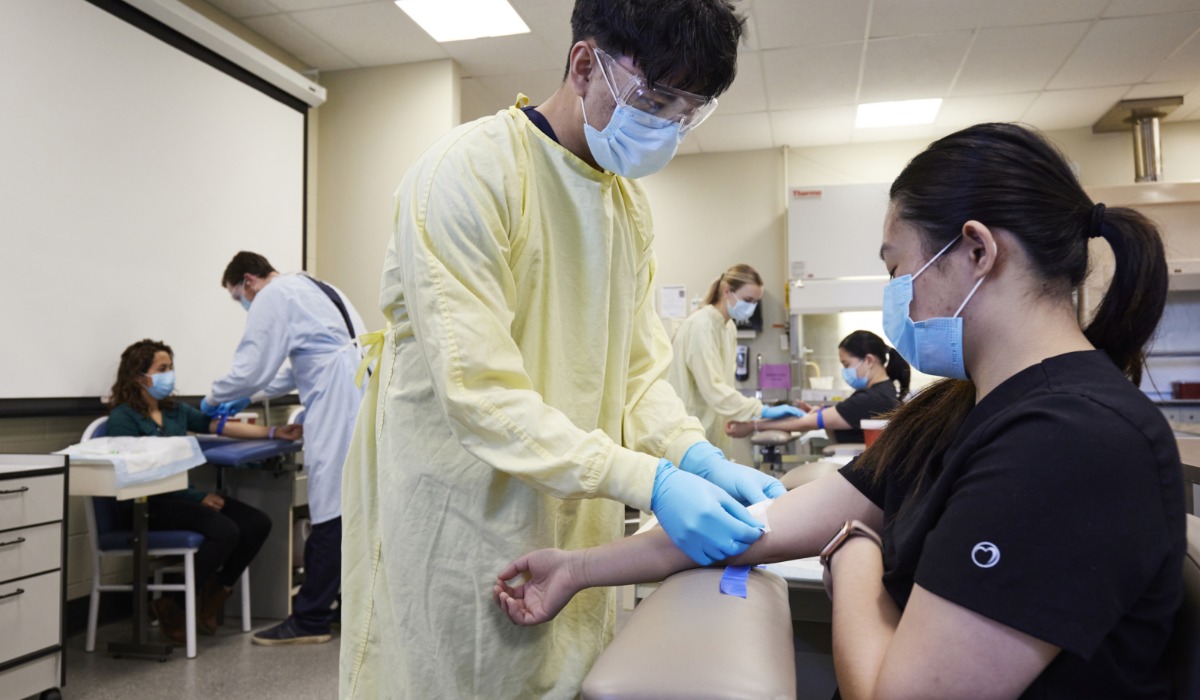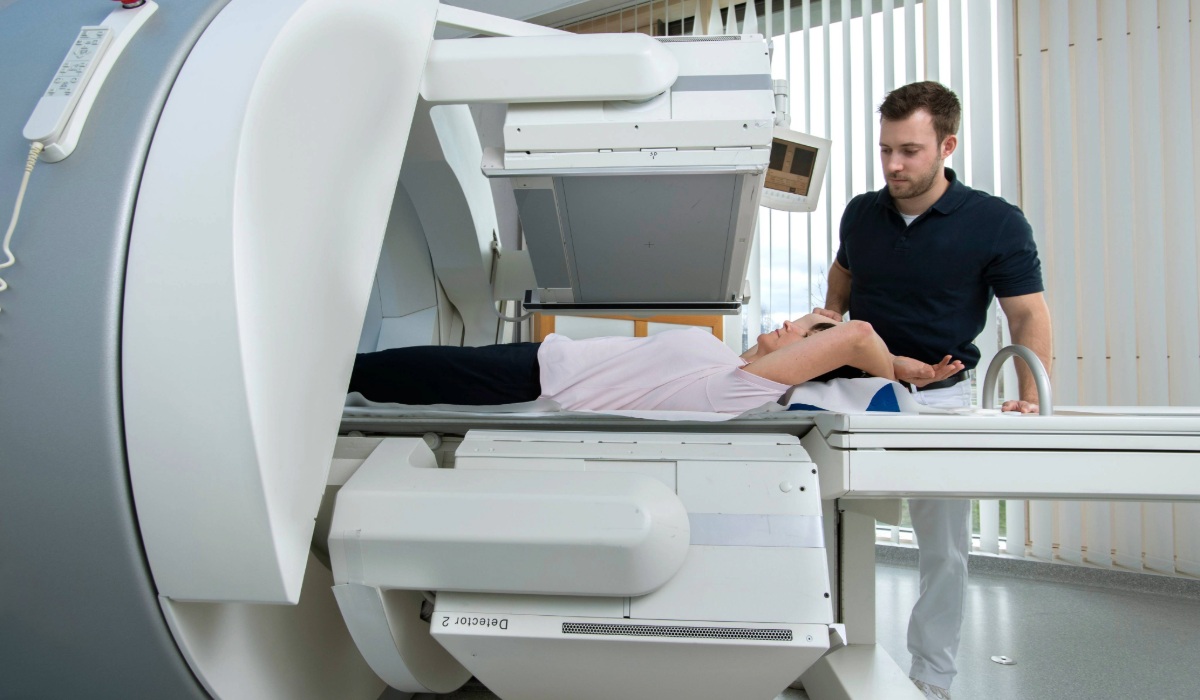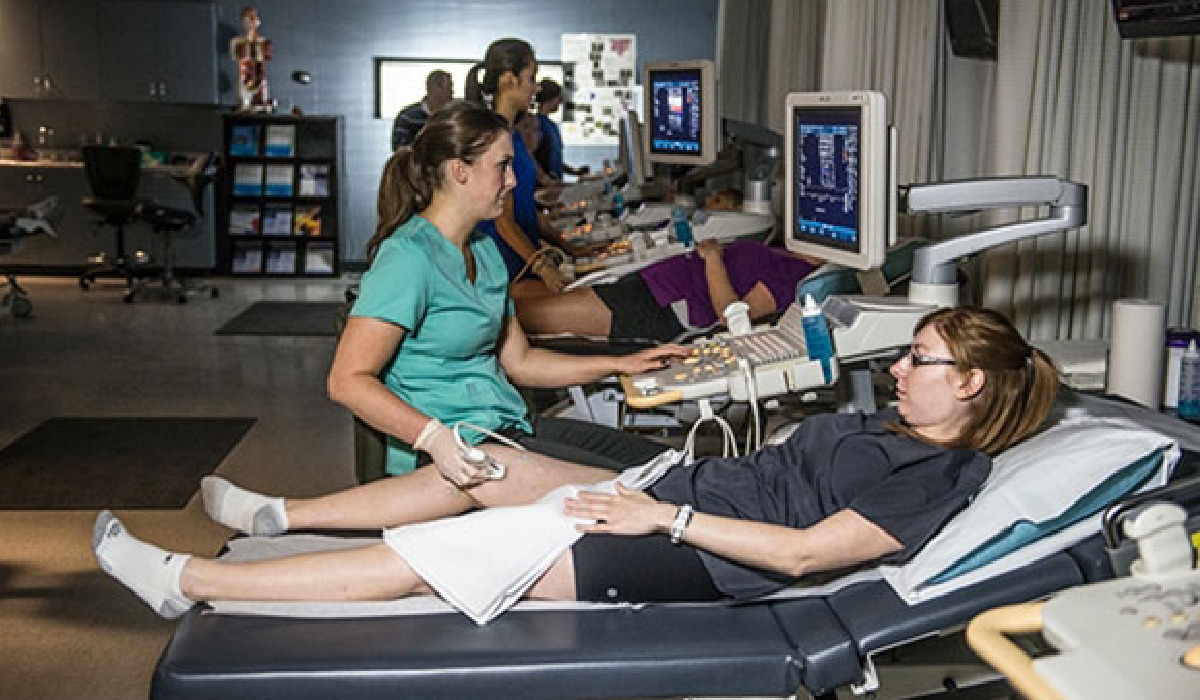Mandatory requirements
Applicants for this program are required to complete the School of Health and Public Safety entrance testing process as an admission requirement for this program by the set deadlines. Review admission requirements for more details.
Overview
Through a combination of teaching theoretical knowledge, clinical skills, and practicum rotations in three various radiology departments, our Medical Radiologic Technology program prepares you to become a proficient radiologic technologist.
As a student, you will:
- learn techniques for correctly positioning patients and X-ray equipment to capture clear diagnostic images
- train on the use and maintenance of various types of X-ray-generating machines
- gain skills in producing digital images to assist physicians in medical diagnoses
- study human anatomy and diseases to understand the physiological basis of the images
- learn management and care of imaging equipment and image production
- receive specific training in CT imaging and the interpretation of CT scans
- gain knowledge of radiation protection for the safety of patients and healthcare workers
- master both general and specialized radiographic procedures
- develop professional conduct and effective patient care practices
- gain insight into specialized imaging processes such as interventional procedures, magnetic resonance imaging (MRI) and ultrasound
- learn the protocols for quality control in radiologic technology.
As a graduate, you'll be ready for numerous entry-level positions in various healthcare settings, such as hospitals and community clinics.
With experience, you can specialize in general X-ray, interventional radiography, computed tomography, and mammography. There are also potential career paths in management roles or as educators in the radiologic technology field.
If you have a strong interest in medicine, healthcare technology, and patient care, this program provides the technical knowledge and clinical skills needed to embark on a rewarding career in medical imaging.
Those in medical radiologic technology tend to be objective, methodical and innovative.
You need:
- a sense of responsibility and integrity
- to tolerate the sight of human blood and tissue
- to be comfortable performing patient care procedures which may be sensitive or performed in close proximity
- an eye for detail and accuracy
- patience and adaptability
- sensitivity to the needs of ill and injured people
- good speaking and writing skills
- the ability to put people at ease
- an interest in science and technology
- a willingness to keep your skills and knowledge up to date
- organizational skills
- problem-solving and critical-thinking skills
- the ability to work well in a team
- the ability to manage your stress well
- the ability to reach a minimum height of 180 cm (to move overhead equipment).
As a medical radiologic technologist, you may work in environments where a considerable amount of time is spent on your feet, or you're performing repetitive tasks. You must observe safety precautions and pay attention to ergonomics to reduce your risk of exposure and injury.
Individuals with previous chronic or repetitive strain injuries have experienced re-injury or aggravation of these conditions in this program and profession. You must also be able to tolerate latex and disinfection chemicals.
You are strongly encouraged to refer to the ALIS website for career, learning, and employment information for medical radiologic technologists to ensure you can successfully meet the occupational requirements for the program and profession.
You will complete required clinical practicums in this program.
You will be assigned practicum placements with consideration given to your preference of location. However, due to limited availability in Calgary, it might be necessary for you to travel or relocate outside the city.
The healthcare field has a strong focus on health, wellness, and fitness to practice due to the demanding nature of the work and Occupational Health and Safety requirements. As such, special considerations will not be granted based on individual circumstances or preferences, except those stated as protected grounds when an accommodation has been approved.
In compliance with the practica agreements with our clinical partners, you will be required to provide specific documentation before you can participate in your practicum. Find out what requirements you need for this program.
This program is accredited through Accreditation Canada, and works closely with our Diagnostic Imaging Provincial Advisory Committee to ensure our curriculum continues to meet or exceed provincial and national accreditation standards.
Graduates are eligible to challenge the Canadian Association of Medical Radiation Technologists (CAMRT) certification exam, which is a requirement for registration and employment for registered medical radiologic technologists in Canada. Successful completion of the exam will enable graduates to work anywhere throughout Canada.
Upon successful completion of this program, you'll be awarded a SAIT Medical Radiologic Technology diploma.
Careers and opportunities
Each year, SAIT conducts a survey between February and April to determine the employment rate, salary and satisfaction of our newest SAIT alumni.
![]() 100% graduate employment rate
100% graduate employment rate
![]() $74,422 average starting salary
$74,422 average starting salary
Find out more about our graduate employment statistics >
Our graduates may work in the following occupations. Some careers require additional experience and education.
Associated National Occupational Classification (NOC) codes: 32121, 32122, 32129, 32123.
Career planning support
Unsure which career path is for you? Here are some recommended career planning resources to help you decide your future.
You can also head to Alberta alis for lots of information about careers in Alberta, including quizzes and labour market information to help you narrow down a path.
Finally, you can take our online career finder quiz, which can help narrow your options based on your current skills and interests.
Courses
The Medical Radiologic Technology diploma requires 70.5 credits (23 courses) to complete.
The program spans two and a half years.
| Course | Credits |
|---|---|
|
Anatomy and Pathology 1 focuses on select clinical and anatomic presentations of human health and disease states from the standpoint of the radiologic technologist. Conventional anatomic presentations and images from a variety of medical diagnostic modalities related to the central nervous, endocrine, immune, and cardiovascular systems and hemopoietic sub-system, will be used to demonstrate how structural and functional changes affect radiographic appearances, procedures and protocols. Corequsites:
|
3 |
|
Anatomy and Pathology 2 is a continuation of the course material studied in Anatomy and Pathology 1. Conventional anatomic presentations and images from a variety of medical diagnostic modalities related to the respiratory, gastrointestinal, hepatobiliary, skeletal, and genitourinary systems will be used to demonstrate how structural and functional changes affect radiographic appearances, procedures and protocols. Pre-requisites:
Corequsites:
|
3 |
|
This course introduces the principles of X-ray image formation and manipulation, examining how radiographic equipment works and how the X-ray beam is affected. Focus will be placed on optimizing image quality by manipulating various parameters and variables. Application of theory and hands-on work with X-rays will help encourage the critical thinking skills required to optimize image quality, and to safely operate the imaging equipment. Corequsites:
|
3.0 |
|
This course introduces the chain of infection, and methods to reduce the risk of transmission of microorganisms to healthcare providers and patients. Topics include immunization, routine practice, contact and droplet precautions, sterilization and disinfection, safety, and the Workplace Hazardous Materials Information System (WHMIS). |
1.5 |
|
Radiographic Technique 1 presents an introduction to the positioning of patients for radiographic imaging. Through a blend of theory and hands-on experience, importance will be placed upon correct standards of positioning, the positioning nomenclature and how to develop a workflow. The hands-on component includes performing and critiquing radiographic exposures, identifying radiographic anatomy and developing the cognitive and affective skills to correct mistakes and problem solve. Corequsites:
|
3 |
|
This course explores patient-centered care skills, including the safe transfer of patients, administering medication, and proper use of medical accessory equipment. Identifying and responding to medical emergencies, measuring vital signs, and protecting oneself and patients from disease transmission is discussed. The coordination of care and the importance of compassionate communication between healthcare providers and patients will also be covered. Pre-requisites:
|
3 |
|
This course provides an overview of computed tomography (CT), basic principles of CT, equipment, image acquisition, reconstruction, and quality control. Emphasis will be placed on safety, patient care, assessment, and contrast administration. Pre-requisites:
Concurrent Prerequisite
|
3 |
|
Radiographic Technique 2 expands on Radiographic Technique 1 and covers radiographic procedures for more complex anatomical structures, including the vertebrae, thorax, cranium and facial bones. Standard radiographic positioning, exposures and procedures will be discussed, in addition to nomenclature and how to develop a workflow. A hands-on component will allow learners to practice critiquing radiographic images, correcting mistakes and using problem solving skills in the clinical environment. Pre-requisites:
Corequsites:
|
3 |
|
This course presents specialized examinations, equipment, and related procedures used for imaging various body systems. Focus is placed on bone density, mammography, radiation protection, and patient care. Other diagnostic imaging modalities will also be covered. Pre-requisites:
Corequsites:
|
3 |
|
This course covers routine computed tomography (CT) procedures and protocols along with the cross-sectional anatomy of the abdomen, chest, head, neck, pelvis, spine, and extremities. In addition, focus will be placed on identifying anatomical structures on various cross-sectional imaging planes. Learners will also cover CT imaging for interventional procedures. Pre-requisites:
|
3 |
|
In this course, you'll explore the essentials of working in fluoroscopic environments, including specialized equipment and fluoroscopic procedures. You'll be introduced to key procedures to determine the functional capabilities and anatomical structures of the digestive, biliary and genitourinary systems, and you'll explore related radiation protection, patient positioning and patient care. The course also covers the essentials of medical and surgical asepsis in healthcare settings. Pre-requisites:
|
3 |
|
In this course, you'll explore the practical skills and critical thinking necessary for performing radiographic imaging in complex healthcare settings. You'll examine mobile and trauma radiography, and learn to adapt techniques to non-routine patients and challenging environments. You'll also get hands-on experience managing radiological exams and performing venipuncture. Effective communication and collaboration with other healthcare professionals is also covered, helping to ensure that you can work effectively in a team to optimize patient outcomes in diverse clinical situations. Pre-requisites:
|
3 |
|
This course delivers a review of medical radiographic technology concepts covered to date, and provides opportunities to integrate experiences in the clinical environment with theoretical concepts. Preparation for the national Canadian Association of Medical Radiation Technologists (CAMRT) exam will also be covered. Pre-requisites:
Corequsites:
|
3 |
|
This course builds on previous learning, with more technologically-advanced concepts related to medical radiologic technology imaging being presented. Opportunities are provided for the learner to integrate theoretical concepts in a clinical environment. Preparation for the national Canadian Association of Medical Radiologic Technologists (CAMRT) exam will also be covered. Pre-requisites:
Corequsites:
|
3 |
|
This course explores the concept of research for allied healthcare workers, and reviews elements of the research process. Research methodologies applicable to healthcare will be examined, with topics including forming a research question, designing research strategies, critical thinking, and analyzing research data. Pre-requisites:
|
1.5 |
|
This course provides an opportunity to witness radiographic procedures in a clinical setting, while demonstrating professional behaviours and applying ALARA principles. Focus will be placed on observing radiographic examinations under the direct supervision of a registered technologist. Pre-requisites:
|
1.5 |
|
This practicum course involves performing procedures under the supervision of registered technologists in a clinical environment. Aspects of clinical work covered include practice in patient care, radiographic positioning, equipment use, radiation protection, and image evaluation. Pre-requisites:
Corequsites:
|
6 |
|
This practicum course provides learners with further opportunities to practice patient care, radiographic positioning, equipment use, and radiation protection in a diagnostic imaging department. Emphasis is placed on mastering image evaluation and typical positioning. More advanced procedures are also introduced. Pre-requisites:
Corequsites:
|
6 |
|
Clinical Practicum 3 builds on the previous practical and involves clinical education under the supervision of registered technologists. Focus will be on continued practice in patient care and handling, radiographic positioning, equipment use, radiation protection, quality control and image evaluation. Mastering advanced procedures will also be emphasized. Pre-requisites:
Corequsites:
|
6 |
|
This course introduces essential skills for diagnostic imaging professionals. Interaction with patients, healthcare environments, and teams will be discussed. Professional standards, behaviours, and legal and ethical requirements are also addressed. Focus will also be placed on communication in the evolving healthcare environment. |
3 |
|
This course builds upon concepts presented in earlier courses, with a focus on thoroughly preparing you for your clinical practicum by examining professional expectations and appropriate conduct. You'll explore skill development in critical thinking and compassionate and inclusive communication, and you'll establish your own personal wellness strategies and coping mechanisms. You'll also get hands-on practice developing the professional values, attitudes and skills required by medical radiologic technologists to interact with preceptors, patients and other members of healthcare teams. Pre-requisites:
|
1.5 |
|
This course provides an introduction to quality control tests for radiographic equipment, and the development and maintenance of a quality assurance program. The values of resource management and quality assurance in the diagnostic imaging department will also be discussed. Pre-requisites:
|
1.5 |
|
Radiation Protection introduces radiographic policies, regulations and procedures that are based on the as-low-as-reasonably-achievable (ALARA) principle for the protection of self, the patient and the other individuals who may find themselves exposed to medical radiation. Topics will also include the effects of ionizing radiation on body tissues and the detection and measurement of radiation. Pre-requisites:
Corequsites:
|
3 |
Progression
You must attain a PGPA and/or a CGPA of 2.0 or better each semester and pass the prerequisite courses to progress through the program.
To qualify for graduation, you must pass all courses, attain a CGPA of 2.0 or better and complete course requirements within the prescribed timelines.
Admission requirements
Applicants educated in Canada
Applicants must demonstrate English language proficiency and meet the following requirements or equivalents:
- at least 75% in Math 30-1 or Math 30-2, and
- at least 75% in English Language Arts 30-1, and
- at least 75% in Physics 30, and
- at least 75% in Biology 30, or Chemistry 30, or Science 30
You also must achieve a mark of at least 50% in the School of Health and Public Safety's Entrance testing process.
SAIT accepts high school course equivalents for admission for applicants educated outside Alberta.
All applicants who were educated outside of Canada must demonstrate English language proficiency and provide proof they meet the program admission requirements outlined above with an international document assessment. Find accepted educational documents and assessment options.
SAIT may also accept courses completed at certain international post-secondary institutions.
Academic Upgrading
Missing an admission requirement for this program? Upgrade your prior education to help you receive admission into one of SAIT's career programs.
English language proficiency
All applicants must demonstrate English language proficiency prior to admission, including students educated in Canada.
Transfer agreements
At SAIT, we have created transfer agreements with partner institutions to allow you to earn course credits toward your SAIT program based on your previously completed credentials.
Transfer Alberta search tool
Use the Transfer Alberta search tool to see all transfer agreements between Alberta post-secondary institutions (including those with the University of Calgary, Mount Royal University and Bow Valley College.)
Search transfer agreements in Alberta
Transfer options for graduates
When you have completed this program, you may continue your education at a partner post-secondary institution. These transfer agreements include partnerships within and/or outside of Canada.
Credits this program transfers to
- Available credits:
- n/a
If you are considering a future career with the Canadian Armed Forces (CAF), you can apply for their paid education program.
Once you are an accepted non-commissioned member (NCM) in the CAF, you'll have all your tuition, books, and academic equipment covered while receiving a salary with benefits. Upon your graduation, you'll be eligible to work for CAF as a Medical Radiation Technologist.
- Available credits:
- 66
Upon successful completion of this program, you can ladder into the third year of TRU's Open Learning Bachelor of Health Science program, provided you meet the admission requirements.
Available intakes
Fall 2026
Start dates:
- Domestic students: Waitlisted
-
-
Application deadline: March 31, 2026
-
- International students: Open
-
-
Application deadline: May 29, 2026
-
Costs
2025/26 tuition and fees
The following costs are effective as of July 1, 2025.
The estimated total cost of tuition and fees is based on the suggested schedule of study. Following a modified schedule will impact the fees you pay per semester and may alter final costs.
Domestic students
*.5 indicates a combination of full-time semester(s) and part-time semester(s) in the same academic year. In many cases, students are completing a practicum during their part-time semester. Part-time students are those taking less than nine (9) course credits in a semester. You will not be eligible for the UPass in your part-time semester.
**Based on six months of health and dental benefits only.
The program total is based on the estimated amount you will pay if you enter this program during the 2025/26 academic year. The program total amount listed on your letter of admission may appear higher. This amount is your maximum tuition guarantee for the program. SAIT will not exceed this maximum, regardless of changes in tuition and fees between academic years.
*.5 indicates a combination of full-time semester(s) and part-time semester(s) in the same academic year. In many cases, students are completing a practicum during their part-time semester. Part-time students are those taking less than nine (9) course credits in a semester. You will not be eligible for the UPass in your part-time semester.
**Based on six months of health and dental benefits only.
Books and supplies are approximately $3,200 for the entire program.
This is a bring-your-own-device program with a standard computer hardware and software requirement. See the specific requirements on our computers and laptops page. A laptop (non-Android) or Apple tablet is required. A mobile phone is not a suitable alternative.
Find your booklist on the SAIT Bookstore's website. Booklists are created by semester and available approximately two weeks before classes begin.
Required uniforms and personal protective equipment (PPE)
The industry-approved PPE you'll need will be discussed during your first few days of classes.
For your first day of labs, your required uniform will include:
- plain black scrub-style pants and top (coloured piping accents are acceptable)
- closed-toe and heel footwear in plain white or black (no logos or stripes of colour), runners, or duty shoes
- short black/white lab coat (optional.)
Additional fees
- A fee is associated with obtaining a police information check, including a vulnerable sector check, payable to the police or the Royal Canadian Mounted Police (RCMP).
- You must have your immunizations reviewed by the SAIT Health Clinic. There is a $75 charge to review vaccine history. Any vaccines you need to be administered will result in additional charges.
- A fee of approximately $50 to $100 is associated with an electronic student permit checking submission, which is required for clinical practicum placements, payable to Synergy Gateway through the Verified software platform.
- Basic Life Support (BLS) Provider (Level C) CPR annual updates are required. All CPR courses must be from the Heart and Stroke Foundation.
- A fee is associated with the CompTracker application used in this program.
- You are responsible for additional expenses related to your practicum, including pre-practicum requirements and relocation costs to practicum sites outside of Calgary.
- Canadian Association of Medical Radiation Technologists (CAMRT) certification exam fees are approximately $840, with an additional exam registration fee.
- Annual dues to the Alberta College of Medical Diagnostic and Therapeutic Technologists are approximately $100.
Financial aid
Paying for your education may feel overwhelming, but we have resources and programs that can help, including information about payment options, student loans, grants and scholarships.
Application process
Before applying to this program, you must complete the necessary entrance tests.
Refer to Health and Public Safety entrance testing to find the required tests and deadlines and instructions on how to book your exams.
Ready to apply?
Follow our step-by-step guide to submitting a successful application.
Communication during admission
Email is the primary source of communication during the admission process. Ensure your personal email account is managed appropriately to receive our emails, files and communications.
We recommend you add hps.info@sait.ca domain to your safe senders' list or you risk missing critical email messages.
Begin your application
Apply now using the online application portal.
Ensure you have a valid Visa or Mastercard to pay the non-refundable application fee of $120 for domestic applicants or $175 for international applicants.
Information sessions
Prepare for a strong start in your chosen program or get the details you need to decide your future path.
Our expert staff and faculty are ready to answer your questions and provide information about the following:
- What sets SAIT apart
- An introduction to the program and area of study
- Admission requirements
- Future career paths
- Information on the earning potential and graduate employment rates.
Contact us
School of Health and Public Safety Advising
-
Email - hps.info@sait.ca
International Student Advising
-
Phone - 403.284.8852
-
Email - international@sait.ca
Subscribe for updates
Your journey starts here! Sign up to get important updates on:
- Health and medical programs
- Application information
- Relevant news and events

Oki, Âba wathtech, Danit'ada, Tawnshi, Hello.
SAIT is located on the traditional territories of the Niitsitapi (Blackfoot) and the people of Treaty 7 which includes the Siksika, the Piikani, the Kainai, the Tsuut’ina and the Îyârhe Nakoda of Bearspaw, Chiniki and Goodstoney.
We are situated in an area the Blackfoot tribes traditionally called Moh’kinsstis, where the Bow River meets the Elbow River. We now call it the city of Calgary, which is also home to the Métis Nation of Alberta.




